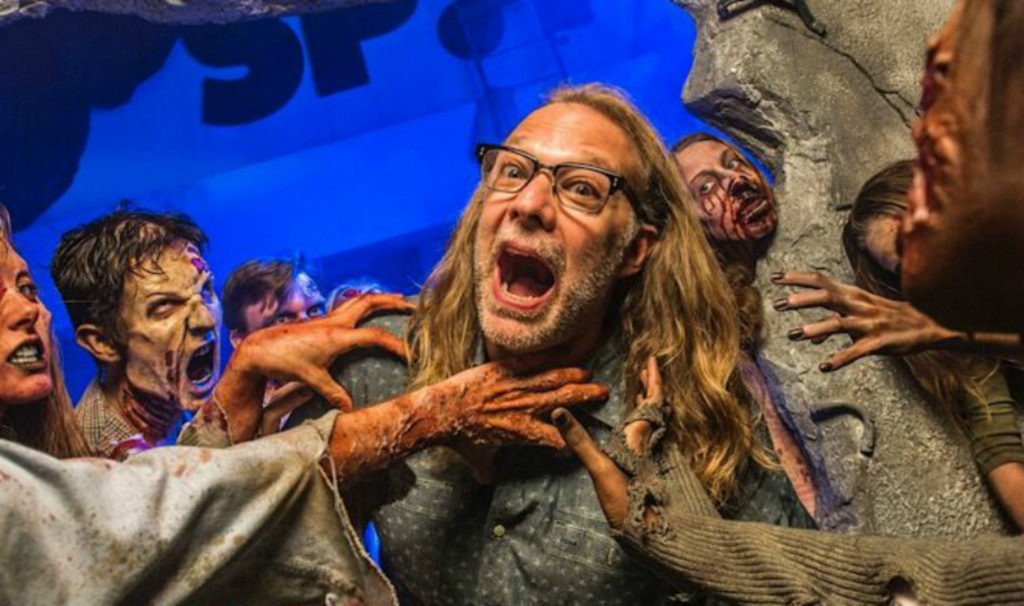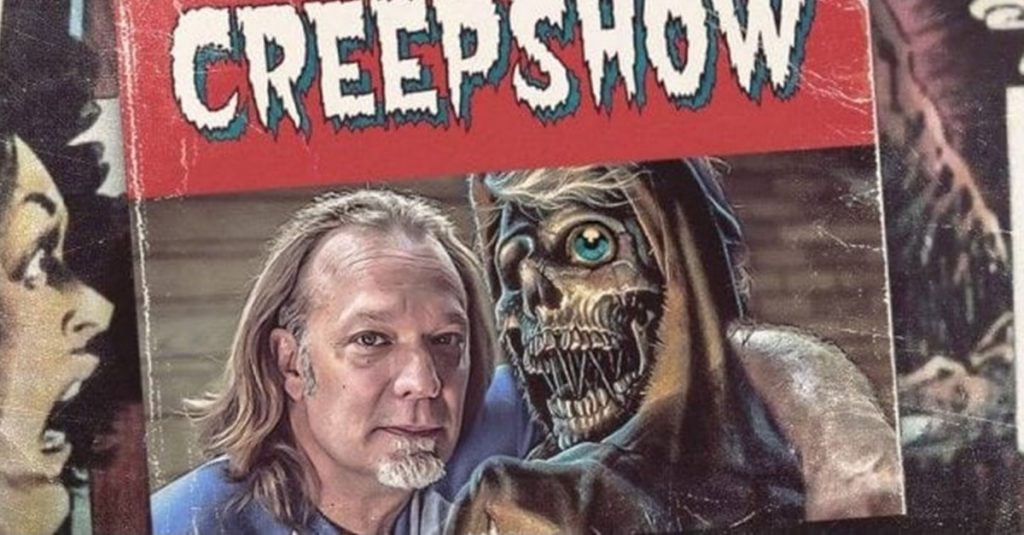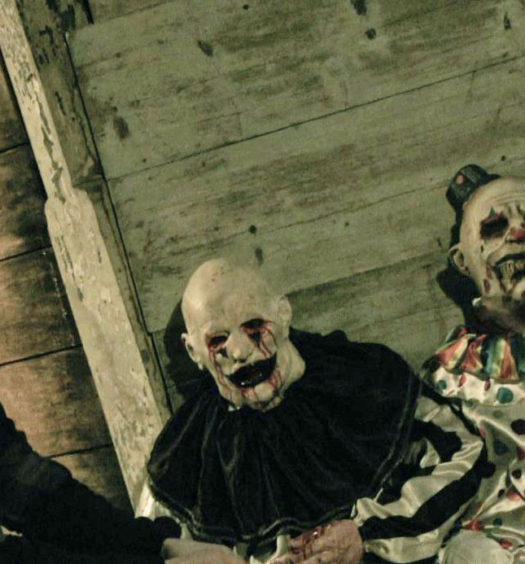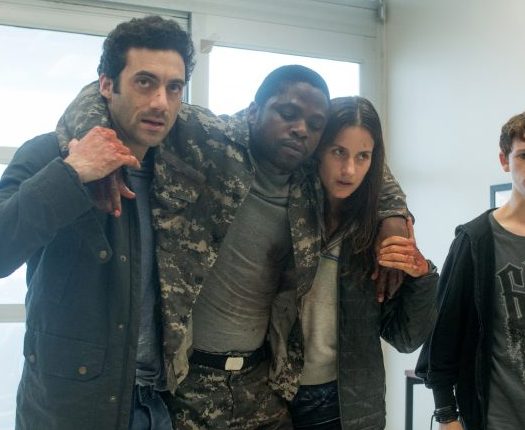How involved is one of the biggest names in horror, the one who wrote the original Creepshow? Stephen King and his son Joe Hill were happy to contribute to the continuation.
Nicotero says, “We sent him a bunch of stuff and he’s been super supportive and he’s been pretty great about everything. Stephen had two different stories that he had proposed. Once we got into production and I started to see where we were landing I kind of felt that there was one that was actually perfectly suited for me, which was ‘Gray Matter,’ the story that I’m directing.
Then I thought ‘Well, we got Stephen King so we’re going to need Joe Hill.’ I’m a huge fan of Joe’s. I loved Horns and NOS4A2 and Heart Shaped Box. I fucking love all of his stuff. Joe sent a couple of stories over and there was one that Joe said ‘This one’s kind of dark’ and after I read it I was like ‘Fuck me, that’s really dark… It’s so fucked up.’ That was the fun part, was reading all this stuff.”
An artifact from the past proved to Nicotero that history not necessarily repeats itself, but finds a unique way to write the present.
“Years ago when I lived in Pittsburgh after Creepshow and Day of the Dead, Romero was moving his offices. Michael Gordon, who was his office manager and cinematographer called me up because they needed a bunch of kids to come help clean up the basement. I was 16,” Nicotero remembers. “So we’re moving boxes and paperwork and all this shit and Michael asks us to throw it all away. There was a letter from Stephen King to George Romero typed on the old onion paper with a typewriter with fucking white out and all that shit. There was a three-page letter about Creepshow and it was some of Stephen’s ideas for the script and there was a not on the last page on the side handwritten ‘What do you think about Joe playing the kid in the opening of the movie? That would be cool. I don’t know if he can act, but it would be great.’ It’s handwritten. I still have it. Of course I keep everything, so I still have that letter.
I sent it to Stephen last year and the next day Joe Hill had a meeting with AMC and Ben Davis called me and said ‘All he talked about was his fucking letter that you have. How weird is it that you have the letter?’ It was just crazy. I’ve known Stephen since I was a kid, but I love that I still have that letter. He was like ‘That’s fucking great.’
I have an original Creepshow script and tucked inside is my original invitation to the cast and crew screening that I was sent. It’s got my parents’ address. Tina Romero, George’s daughter, came and visited and she was like ‘My dad would just love every second of this’ because of all of it and because of me and Harrison working together. It just gives me chills.”

It’s just all been a blur of monsters and mayhem and craziness.
What’s going to set Creepshow apart? Nicotero can easily point out the factors that make this anthology the one to watch: Flair and fun.
Nicotero responds, “I think Creephow, with the vibe of the comic book-come-to-life and all the panels and all that stuff, feels like it’s a different experience. We are really embracing the split-screen and going through the panels and telling the stories where you see one of the characters getting into a car and then we pan over and then it goes into comic book panels and then it tells a little bit of story and then we come out of the panels. It’s got that flair, that flavor to it.
When the network watched the first cut of one of the episodes I don’t think they really understood how much we were embracing that aspect of it. The camera goes across the title page and The Creep is there and you hear the little giggling. They were like, ‘Wow! You guys are all in.’ If we weren’t all in, then it would probably just seem like another anthology show.
You know there are certain stories that lean into it, like Rob Schrab’s Nazi-werewolf thing. That really leans into it and Rob’s got that background. He’s got that great comic book comedy background. You know the great thing about this too, which I think sets it apart from other anthologies, is that the tone of every single story is dramatically different. There’s some that are genuinely funny and there’s some that are really dark. It’s not like when you get into certain anthologies and they tend to have that same kind of theme that’s repeated over and over again. With this I do think that the stories are dramatically different enough that some of them are kind of straight horror and might not have as many of those comic book elements to it, but some of the other ones are just gonna be fun.”
There’s a horror TV boom happening right now. Being one of the biggest contributors to consumer desire, with The Walking Dead, Nicotero attributes the zombie show’s long running success to a more human factor.
He agrees, “I think The Walking Dead started it. I think back to when we shot Land Of The Dead. George was nervous about how gory we could get for the ratings. When we did the first season of The Walking Dead it was gorier than any movie was. Between that and Game of Thrones, people went ‘Wait a minute. You can do that kind of horror on television now’ and then American Horror Story came out and then it really did explode. Now it’s streaming, we’ve got Black Mirror, which I love, and there’s so many great shows which allows that short form of storytelling in terms of the anthology stuff to really be appealing to people.
When we first did The Walking Dead, we did six episodes and everyone asks if we expected it to become so huge, but how would you ever imagine that? I always attribute Frank Darabont and putting that ensemble cast together because the cast was so impeccable that there was something that everybody could really do and I really think that’s what makes it great.
One of the things I’ve noticed, when I’m sitting in the editing room and I’m looking at all the dailies and I’m talking to my editors, I’m like ‘Listen, the monster is the monster, but you know it’s how the humans react to the monster that people identify with.’
It’s like Joe Dante’s werewolf transformation in The Howling. Dee Wallace is in the corner and she’s freaking out, of course I’m dating myself going to a 1980’s movie, but it’s her reaction to the transformation that really makes it terrifying. The audience doesn’t put themselves in the place of the monster, they put themselves in the place of the person watching the monster. I think that’s one of the things that spending decades crafting the gory creature stuff of it does. The filmmaker part of it tells me that that’s another ingredient. You need to have the human emotion. That’s what The Walking Dead has, that’s in American Horror Story, that’s what Game of Thrones has, that’s what all those shows have: it has that human emotion.
I think people often understand that, but they don’t get that. That it’s the human emotion that people identify with and that’s why they keep coming back. They want to see what’s going to happen to Dara or Carol or Rick or whoever. When Frank initially wanted to do The Walking Dead he had always said he’d love to do a zombie story because he loved Night of the Living Dead, but he just didn’t know how to tell it in two hours.
It’s hard because you have to set up these characters, get the audience to invest in them, and then take them on this journey and do something awful in about 18 minutes, not a hundred and forty hours like we’ve had on The Walking Dead… It’s kind of like reverse engineering everything I’ve been doing for 10 years.”
Interview continues on the next page…































